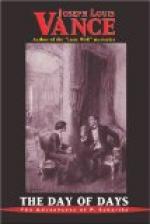“More human than in line with the best literary precedent, eh?”
“That’s me. I seen he was sore when the dame turned him down, too, and started right off wondering if maybe it wasn’t a jealousy plant. I seen this sorta thing happen before. Not that I blame him for feeling cut up: that was one swell piece of goods you bundled into numba two-thirty.”
P. Sybarite’s cigar dropped unheeded from his lips.
“What!” he cried.
The detective started.
“Wasn’t that the numba of the lady’s cab—two-thirty?”
“Good God!” ejaculated P. Sybarite, jumping up.
“What’s hit you?”
“I’m going!” the little man announced fiercely.
“Your time allowance ain’t expired by several minutes—”
“To hell with my time allowance! Try to keep me, if you like!”
P. Sybarite strode excitedly to the door and jerked it open. The detective followed him, puffing philosophically.
There was no one in sight in the hall.
“Looks like you got a fine show for a clean getaway,” he observed cheerfully between his teeth. “Your friend’s beaten it, the boss has ducked the responsibility, and you got me scared to death. Besides—damn ’f I’m going to be the goat that saddles this hash-hut with a suit for damages.”
His concluding words were addressed to the horizontal folds of the inverness that streamed from the shoulders of P. Sybarite as he bolted unhindered through the Fifth Avenue doorway.
XIX
NEMESIS
“Dolt!... Blockhead!... Imbecile!... Idiot!... Numskull!... Ass!... Simpleton!... Loon!...”
The chill air of early morning wiped the blistering epithets from his lips as he fled like a madman down Fifth Avenue, at every stride wringing from the depths of an embittered bosom new and more virulent terms of vituperation with which to characterize his infatuated stupidity—and finding one and all far too mild. In simple truth, the King’s English lacked invective poisonous enough to do justice to his self-contempt.
Deliberately had he permitted himself to be duped, circumvented, over-reached. He had held in his hand a tangible clue to that mystery which had so perplexed him—and had allowed it to be filched away before he could recognise it and shape his course accordingly.
Why had he never for an instant dreamed that the term “two-thirty” could indicate anything but the hour of some otherwise undesignated appointment? Of course it had signified the number of Marian’s carriage-check, “230”: two hundred and thirty, rolling off the modern tongue, stripped to essentials—thanks to the telephone’s abbreviated influence—as, simply, “two-thirty”!
And he had held that check in his hand, had memorised its number and repeated it to Marian, had heard it bawled by the carriage porter, had shouted it himself in reply: never for an instant thinking to connect it with the elder Shaynon’s parting admonition to the gang leader!




